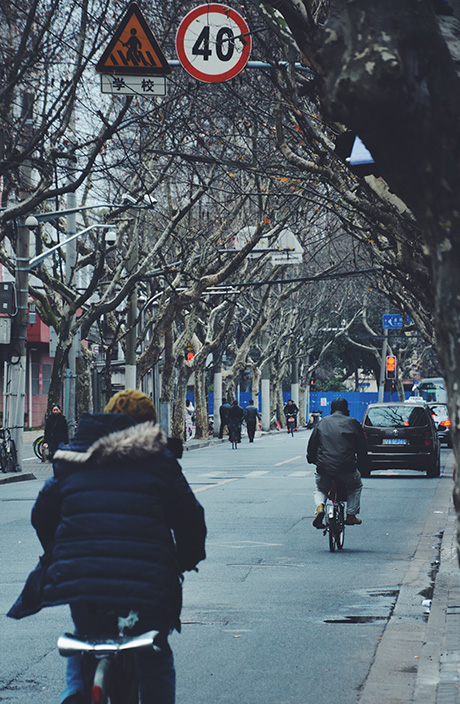This is part of our series of interviews with some of the speakers at the 2017 Shanghai International Literary Festival
Stretching about three kilometers from east to west in the former French Concession, today’s Changle Lu is home to a mix of modern residential and office buildings, Shanghai-style old lane houses, nail salons, boutiques and restaurants serving cuisines as diverse as the nationalities of its residents.
NPR’s Shanghai correspondent Rob Schmitz has been living on the street with his wife and two young sons for the past seven years. His 2016 book, Street of Eternal Happiness: Big City Dreams Along a Shanghai Road, takes place right in the middle of it.
Its title – an eloquent and romantic translation of Changle Lu (长乐路, literally ‘long happiness road’) – might give a fairytale impression of rainbows, roses and lollipops. But in reality, the book is a collection of snapshots of real people and the long and winding journeys of how they all ended up on the same street.

Having started in 2012 as a series that aired on American Public Media’s Marketplace (Schmitz was its China correspondent from 2010-2016), each six-minute-long episode focuses on someone who lives or works on Changle Lu and how their stories tie in to the greater scheme of things happening around the country, a product of its slowing economy and rapid urbanization in recent years.
“I wanted to take a step back from the busy news cycle to focus on stories of real people and how these economic changes were impacting everyday normal laobaixing (老百姓, common people),” Schmitz says when we meet for coffee near his home on the Street of Eternal Happiness.

“It’s very character-driven,” he explains. “Part of the reason I wrote it is because I haven’t read a book that’s about real Chinese people living in modern Shanghai, and I felt there needed to be one. Most of the books about the city focus on the decadent 1920s and 30s… they sell well because they are full of sex, drugs and violence, but that hasn’t been Shanghai for nearly 100 years.”
Free of time limitations for the book, Schmitz is able to look at his neighbors’ lives in detail and build a narrative for each storyline, diving deeper into his characters’ dreams, how these dreams have changed over time, and the motivation to realize their dreams on a daily basis. He adds, “You build more compassion when you’re telling stories in a book.”

For a few years, Schmitz became close friends with those he profiled, spending time with them on his days off, listening to their stories, observing their interactions with family, friends and other people.
“Dialogue is very important for my work as a radio reporter… and it’s an essential element for the book as well. It reveals people’s motivations and gives the stories more immediacy,” he says, recalling scenes of intense bickering inside the home of Uncle Feng and Auntie Fu – a congyoubing vendor and his wife who are constantly at odds due to Feng’s disapproval of Fu’s get-rich-quick plans. It’s one of the five narratives in Street of Eternal Happiness.
As we walk past 810 Changle Lu, Schmitz stops and notes, “Ah, they changed the name again; it’s now ‘2nd Floor Natural Flavor.’” He’s referring to a café co-owned by Chen Kai (CK), the book’s youngest character.

Chen Kai at his cafe.
Born in the 1980s, the F&B entrepreneur/accordion salesman/musician’s unsuccessful suicide attempt following his parents’ divorce at the age of 11 marks one of the darkest moments in Street of Eternal Happiness. CK’s road to redemption and willingness to take risks by leaving a steady job at a state-owned factory and moving to Shanghai to pursue his passion in music and later finding Buddhism, however, is a remarkable journey. “He’s the first generation in his family to be able to make money, but when he realizes that material wealth isn't going to make him happy, he started looking inward on a spiritual level… I find his story really inspiring,” Schmitz adds.
For the first-time author, the character that he relates to the most is Zhao Shiling, the middle-aged owner of Jin Le flower shop on Changle Lu’s eastern end. “I’m from a small town of 2,000 people in Minnesota; I grew up surrounded by a small town mentality but ended up living in a big city just like Zhao did,” Schmitz explains. “She’s a typical Shandongren – very warm and hospitable – and we share the same sense of humor too.”

Zhao Shiling at her flower shop.
Schmitz, who first came to China in 1996 as a Peace Corps volunteer to teach English in rural Sichuan, says that Zhao reminds him a lot of his initial interactions with the Chinese. “She has the same positive outlook on life as many of my students and friends in Zigong; they are honest, hardworking and won’t let things get them down.”
Humanizing issues that China faces as a result of its dramatic changes over the last century through his neighbors’ experiences is the author’s greatest strength. With Zhao’s story, he takes readers on a journey that started with her surviving leukemia as a teenager, and later escaping an abusive husband back in her hometown in 1990s – a time when Deng Xiaoping was promoting the idea of Gaige Kaifang (改革开放, reforming China’s economy and opening up to the outside world’) across China.

Touched by Deng’s speeches, Zhao moved to Shanghai as a migrant worker at an electronics factory with the hope of being able to provide a better future for her sons, who joined her in the city several years after. Through Zhao’s eldest son, Big Sun, Schmitz sheds light on the country’s hukou (household registration) system, which denied him a chance for better education in Shanghai due to his roots in Zaozhuang, Shandong.
“They all have really big dreams – spiritual dreams, dreams for their children, etc. They are all taking part in the spirit of Shanghai – an enormous city full of money and opportunities,” Schmitz says of common qualities that his characters share. “Most of these folks have every reason to be cynical or pessimistic, but they are not. They keep driving themselves… I see a lot of hope in every single one of them.”
Since its initial release in May 2016, the book has received positive feedback from readers in the West, but Schmitz admits he’s most concerned about how Chinese readers will perceive the book when a translated version comes out later this year in Chinese mainland “I want to make sure the way that I saw things was [an accurate portrayal],” he tells us.

Under the naked branches of London plane trees along the Street of Eternal Happiness and next to alleyways with colorful collections of laundry drying in midair, Schmitz reflects upon his choice of the book’s titular ‘character’ – Changle Lu. “I think I would’ve gotten a lot of similar stories if I were to profile a street in Putuo or Zhabei, or even in Wuhan or Beijing… Street of Eternal Happiness takes place in Shanghai, but in some ways it’s not about Shanghai. It’s about the people who are trying to realize their dreams in a country that wants to dream big.”
March 13, 6pm, RMB85. See listing for Glam. Tickets available at their website.The Shanghai International Literary Festival returns to M on the Bund from March 10-22, bringing together authors of all stripes. View the full schedule here. See more interviews with 2017 Shanghai Lit Festival authors here.






















0 User Comments